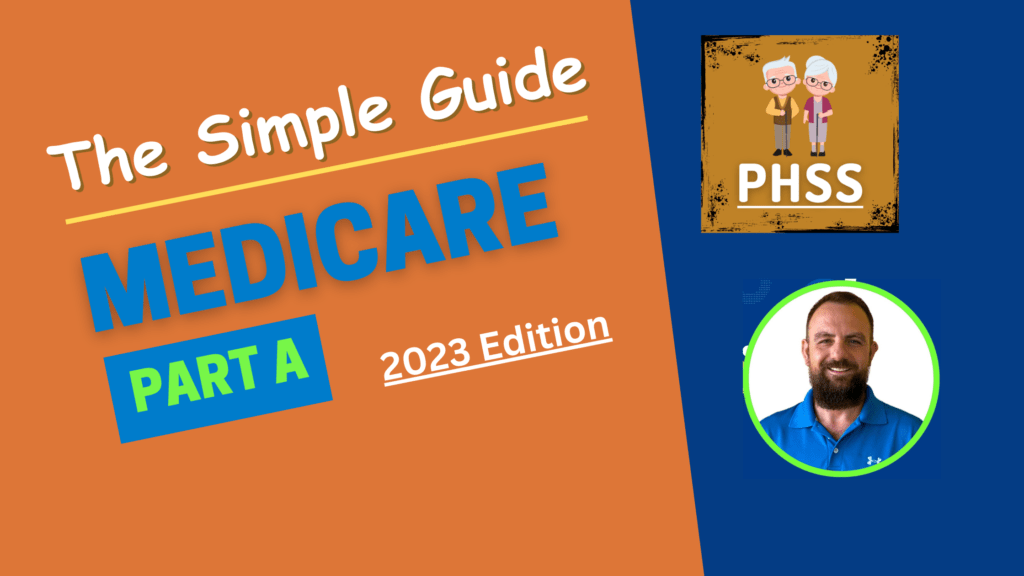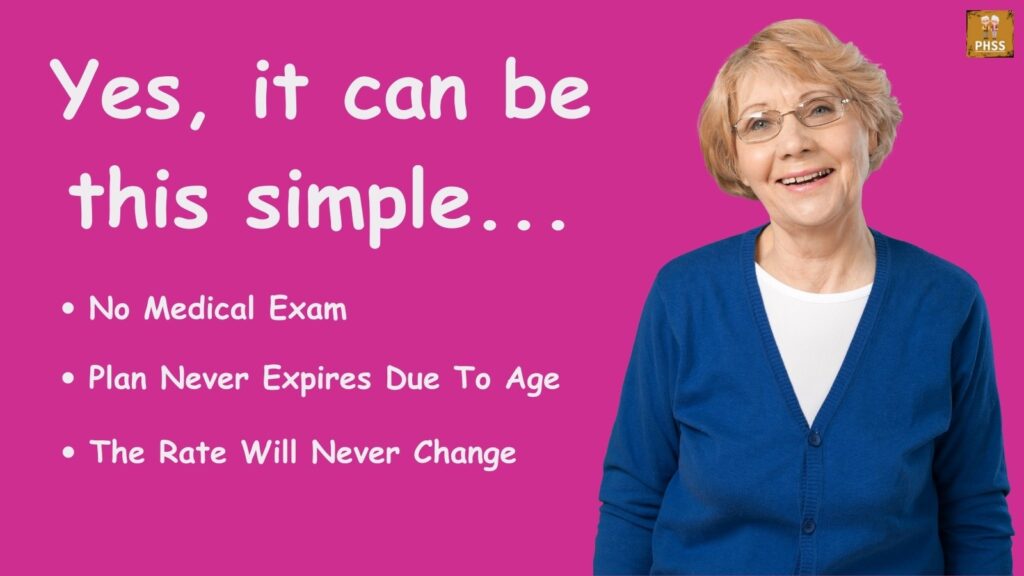As individuals approach the age of 65, it becomes imperative to explore healthcare options that provide comprehensive coverage and peace of mind during their golden years. Medicare, the federal health insurance program in the United States, offers various components designed to address specific healthcare needs. In this article “2023 Simple Guide to Medicare Part A“, we will delve into Medicare Part A, its coverage, eligibility criteria, and benefits, empowering you with the knowledge to make informed decisions about your healthcare coverage.
It is my intention to answer most of your questions in this article, but if I miss something please email me at daniel@pascohernandoseniorservices.org and I will answer your question.
What is Medicare Part A?
Medicare Part A, also known as Hospital Insurance, is one of the primary components of the Medicare program. It primarily covers inpatient hospital stays, skilled nursing facility care, hospice care, and limited home healthcare services. Part A coverage is often automatically provided to individuals who are eligible for Medicare benefits based on their work history or their spouse’s work history. Most people do not pay a monthly premium for Part A.
What are the benefits of Medicare Part A?
Inpatient Hospital Care:
Medicare Part A provides coverage for inpatient hospital stays, including semi-private rooms, meals, general nursing, and necessary hospital services. This coverage includes medically necessary surgeries, diagnostic tests, medications administered during the hospital stay, and other related services.
Skilled Nursing Facility Care:
Medicare Part A covers skilled nursing facility care following a hospital stay of at least three days, provided the individual requires skilled nursing or rehabilitation services. The coverage includes a semi-private room, meals, skilled nursing care, rehabilitation services, and other medically necessary supplies and services.
Hospice Care:
Part A offers coverage for hospice care for individuals with a terminal illness, providing comfort and support during their final stages of life. This coverage includes pain relief medication, counseling, medical equipment, and services that focus on enhancing the patient’s quality of life.
Limited Home Healthcare Services:
Medicare Part A covers a limited range of home healthcare services, typically when they are necessary as part of post-hospitalization recovery or for individuals with severe illnesses. This coverage may include part-time skilled nursing care, therapy services, medical social services, and certain medical supplies.
Key Considerations and Limitations
Hospital Costs
Original Medicare requires that you pay a deductible for each inpatient hospital “benefit period,” which means you may have to pay a deductible more than once in a single year. In 2023 that deductible is $1600.
A benefit period begins the day you’re admitted into a hospital. Once you are released from the hospital and you are not re-admitted for whatever reason within 60 consecutive days a new “benefit period” will start and you’ll have to pay (In 2023) $1600 again. You can pay this deductible up to 6 times per year.
If you stay longer than 60 consecutive days in the hospital you will have to start paying a coinsurance amount of $400 per day for your stay that last between the 61st through 90th day of hospitalization in any benefit period. If you are still in the hospital after 90 days, Medicare gives you an additional 60 days which are called your “Lifetime reserve days” these can be only used once. Each lifetime reserve day you will have to pay $800 per day (2023).
Skilled Nursing Costs:
If you doctors says that you need to go to skilled nursing facilities to recover more, the first 20 days of your stay medicare will pay 100% of the bill. If you need more time then you have to start paying $200 per day for any days 21 through 100 of extended care services in a benefit period.
Home Healthcare Limitations:
If you are eligible for home health care, you can receive skilled nursing care and rehabilitative care services from approved home health care agencies. These services include physical therapy, occupational therapy, speech-language pathology services, medical social services, medical supplies, and other services provided in your home. Recent changes to the law may allow for the increased ability to utilize telehealth.
While you’re recovering at home, you may require certain assistive equipment such as a wheelchair or walker. Medicare also covers durable medical equipment—typically 80% of the Medicare-approved amount—as long as it meets certain criteria. You can often get the equipment you need through your home health agency and get it delivered directly to your door.
Medicare’s home health care benefit is not a long-term service and supports the program, and it does not provide unlimited coverage. If your care includes any of the following services: 24-hour care, meal delivery, homemaker services, and/or personal care Medicare will generally not cover the cost. Even with all this information, differentiating between home care and home health care can be confusing and we will not be going deeper into this in this article. Please visit Medicare.gov to learn more about it.
Coverage Gaps:
Medicare Part A does not cover certain services such as long-term care in a nursing home, routine dental, vision, or hearing care, and most prescription drugs.
Who is eligible for Medicare Part A?
Generally, Medicare is for people 65 or older. You may be able to get Medicare earlier if you have a disability, End-Stage Renal Disease (permanent kidney failure requiring dialysis or a transplant), or ALS (also called Lou Gehrig’s disease).
Most people get Part A for free, but some have to pay a premium for this coverage.
To be eligible for premium-free Part A, an individual must be entitled to receive Medicare based on their own earnings or those of a spouse, parent, or child. To receive premium-free Part A, the worker must have a specified number of quarters of coverage (QCs) and file an application for Social Security or Railroad Retirement Board (RRB) benefits. The exact number of QCs required is dependent on whether the person is filing for Part A on the basis of age, disability, or End Stage Renal Disease (ESRD).
QCs are earned through payment of payroll taxes under the Federal Insurance Contributions Act (FICA) during the person’s working years. Most individuals pay the full FICA tax so the QCs they earn can be used to meet the requirements for both monthly Social Security benefits and premium-free Part A.
NOTE: Certain Federal, State, and local government employees pay only the Part A portion of the FICA tax. The QCs they earn can be used only to meet the requirements for premium-free Part A; they may not be used to meet the requirements for monthly Social Security benefits.
Premium-Free Medicare Part A Based on Age
To be eligible for premium-free Part A on the basis of age:
- A person must be age 65 or older; and
- Be eligible for monthly Social Security or Railroad Retirement Board (RRB) cash benefits.
An individual who is receiving monthly Social Security or RRB benefits, at least 4 months prior to turning age 65, does not need to file a separate application to become entitled to premium-free Part A. In this case, the individual will get Part A automatically at age 65.
An individual who is not receiving monthly Social Security or RRB benefits must file an application for Medicare by contacting the Social Security Administration.
Part A coverage begins the month the individual turns age 65, provided he or she files an application for Part A (or for Social Security or RRB benefits) within 6 months of the month in which he or she becomes age 65. If the application is filed more than 6 months after turning age 65, Part A coverage will be retroactive for 6 months.
NOTE: For an individual whose 65th birthday is on the first day of the month, Part A coverage begins on the first day of the month preceding their birth month. For example, if an individual’s birthday is on December 1, Part A begins on November 1.
Medicare Part A Based on Age for People Who Must Pay a Premium
People who must pay a premium for Part A do not automatically get Medicare when they turn 65. They must:
- File an application to enroll by contacting the Social Security Administration;
- Enroll during a valid enrollment period; and
- Also enroll in or already have Part B.
To keep premium Part A, the person must continue to pay all monthly premiums and stay enrolled in Part B. This means that the person must pay both the premium for Part B and the premium for Part A timely to keep this coverage.
Premium Part A coverage begins the month following the month of enrollment.
Medicare Based on Disability
A person who is entitled to monthly Social Security or Railroad Retirement Board (RRB) benefits on the basis of disability is automatically entitled to Part A after receiving disability benefits for 24 months. Disabled federal, state and local government employees who are not eligible for monthly Social Security or RRB benefits may get deemed entitlement to disability benefits and automatically entitled to Part A after being disabled for 29 months.
When should I sign up for Medicare?
Generally, we advise people to sign up for Medicare when they’re first eligible to avoid a gap in coverage and/or late enrollment penalties. For most people, Medicare eligibility starts three months before turning 65 and ends three months after turning 65. If you’re already getting Social Security benefits, you’ll be automatically enrolled in Medicare Part A and Part B (you don’t need to apply). However, because you must pay a premium for Part B coverage, you have the option of turning it down. You’ll get your Medicare card about three months before you turn 65.
(Note: Residents of Puerto Rico or foreign countries won’t get Part B automatically. They must sign up for this benefit.)
If you don’t get Medicare automatically, here are some ways to sign up*:
- Online (at Social Security) – You’ll need to create your secure my Social Security account to sign up for Medicare or apply for benefits.
- Call Social Security at 1-800-772-1213. TTY users can call 1-800-325-0778.
- Contact your local Social Security office.
- If you or your spouse worked for a railroad, call the Railroad Retirement Board at 1-877-772-5772.
*When you sign up for Medicare, you can also apply for Social Security benefits at the same time if you want.
Note: If you don’t sign up for Medicare when you’re first eligible, you’ll have to wait until the General Enrollment Period (January 1-March 31 each year) to sign up, and you may have to pay a late enrollment penalty. Learn more about when Medicare coverage starts including special enrollment periods.
For more on Medicare enrollment and eligibility, visit Medicare.gov.
Conclusion:
Medicare Part A plays a vital role in providing essential coverage for inpatient hospital care, skilled nursing facility care, hospice care, and limited home healthcare services. Understanding the benefits and limitations of Part A is crucial for making informed decisions about your healthcare coverage. While Part A is a valuable component of the Medicare program, it’s important to assess your individual healthcare needs and consider other parts of Medicare or supplementary insurance plans to ensure comprehensive coverage for your specific requirements.
If you have questions about Medicare, don’t hesitate to contact one of our local agents who work in your community. Visit PascoHernandoSeniorServices.org to schedule an appointment.





